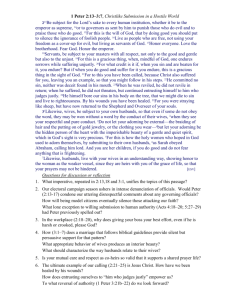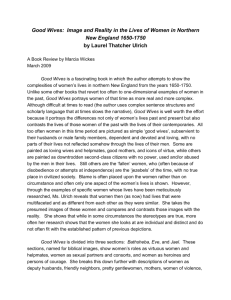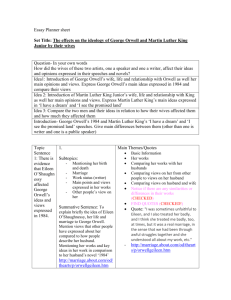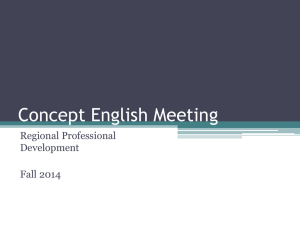Management of remittances and family compound by the first spouses
advertisement
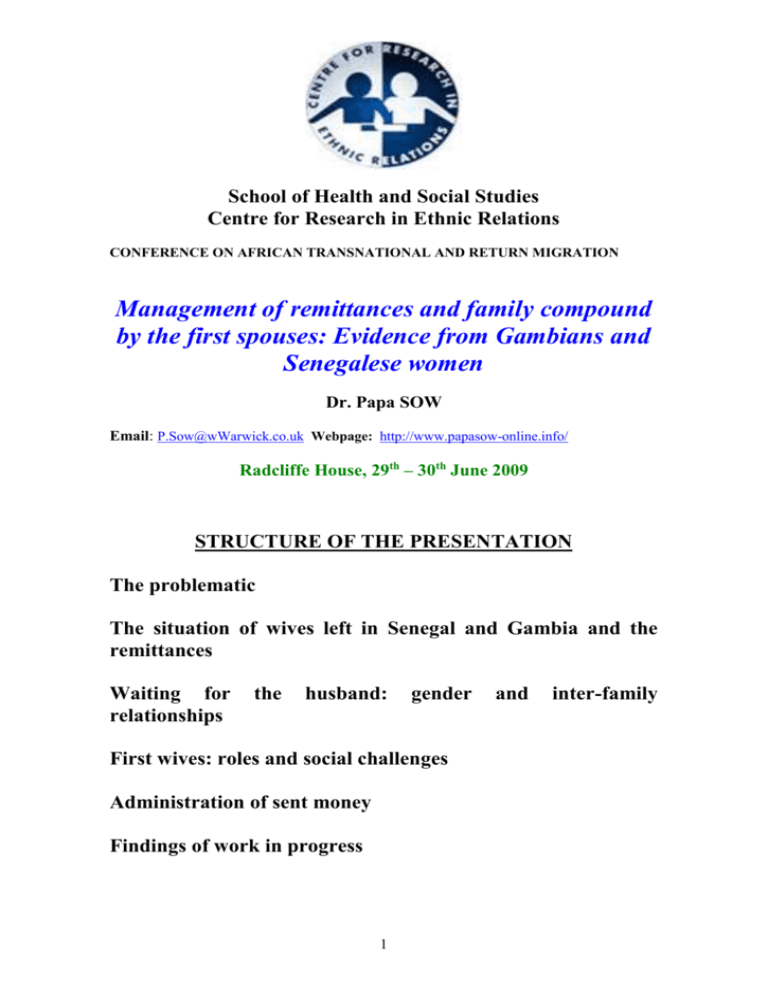
School of Health and Social Studies Centre for Research in Ethnic Relations CONFERENCE ON AFRICAN TRANSNATIONAL AND RETURN MIGRATION Management of remittances and family compound by the first spouses: Evidence from Gambians and Senegalese women Dr. Papa SOW Email: P.Sow@wWarwick.co.uk Webpage: http://www.papasow-online.info/ Radcliffe House, 29th – 30th June 2009 STRUCTURE OF THE PRESENTATION The problematic The situation of wives left in Senegal and Gambia and the remittances Waiting for relationships the husband: gender First wives: roles and social challenges Administration of sent money Findings of work in progress 1 and inter-family ABSTRACT: -This paper focuses on the particular situation of first wives married to immigrants but who remain in their marital homes in Senegal and Gambia. It deals with women in polygamous marriages, who, we nonetheless define as “autonomous” due to their enormous workload, ingenuity, resourcefulness and adaptability. - It aims to analyse the different kinds of power divisions and the valuable responsibilities these women assume in the household - We have observed that the first wives, (thanks to the remittances sent from their immigrant husbands) perform various functions, both social and economic, benefiting from numerous prerogatives which serve to illustrate their real power. 2 Source: found in Google, 2009 3 Source: FIDH – Gambian note, 2005 4 The problematic Stigmatised and illegal in Europe and tolerated in the USA polygamy is recognised in many African countries as forming part of the traditions It remains, therefore, one of the oldest institutions of the world. Polygamy is not observed exclusively among Islamic societies. Opinions are divided: - With polygamy men seem to have more “authority” (although this authority is often debatable) - Others argue that it is a means to combat female celibacy and the “depravity of customs” Family Law in Senegal for example, has recognised polygamous marriages in the same way as monogamous ones since 1972: - Men can marry (monogamous or polygamous marriage) at eighteen years of age - Women are allowed to marry at sixteen (under parents responsibility) and at eighteen without the consent of their parents Plurality in the nature of the marriage bonds In the Senegalese Law we have 3 states: [Monogamy] [Polygamy which allows for up to 4 wives] [Limited polygamy] The Gambian Law recognises 4 states: [Christian marriages] [Muslim marriages] [Traditional marriages] [Non compulsory civil marriages which represent the legal recognition of religious or traditional marriage] 5 Why this paper? …because we want… - To analyse the complex economic and social relationships existing between polygamous Senegalese and Gambian husbands based in Spain and France and their spouses and families based in the origin countries with an emphasis on the role of the first wives - To concentrate on the remittances and specific responsibilities assumed by the first wives in the administration of theses remittances and also the effect that male emigration has on the women - To give special attention to initiatives in the process of autonomy of the first wives in the face of male emigration and domination this has always prevailed ….in our modest knowledge … -There has been little research carried out on the role of the first wives and the administration of remittances -Neither has there been enough study on the influence of polygamy and the distribution of resources proceeding from migrant husbands and their links with emigration -There is hardly any serious research connecting migration, remittances, polygamy and the responsibilities carried out by the first wives. -There are practically no studies on the administration of remittances carried out by first wives in the countries of origin in a contemporary framework capable of providing new information linked with mobility. -Little is known about the factors and trends which determine the behaviour of the first wives, the character of initiatives undertaken with the money sent in the different realms of family and community life. 6 Reasoning …. -It is why this study aims to make a new contribution investigating the dynamics determining the administration of the remittances carried out by the first wives -The analytical perspective we suggest reintroduces the individual strategies of the emigrants in structural frameworks and private institutions. Methodology … -Observations, short life stories and semi structured interviews in France and Spain (2008 and 2009) -Observations and interviews carried out in the countries of origin of the immigrant husbands (Gambia and Senegal): by now 10 families tightly linked with migration visited; 4 families with no links with immigrants or immigration were also selected and interviewed. Caution! -The Working Paper is currently at an experimental, explanatory phase. -We are not really interested in the flows, channels and globality of the remittances sent or pure statistics, but rather the social vocation of the remittances and the fluctuations in social status of the wives of polygamous marriages. 7 The situation of wives left in Senegal and Gambia and the remittances A series of publications have already been devoted to the study of the situation of African women both in a rural and urban context (Paulme, 1952; Mac Call, 1961) In all Africa, and particularly in Senegal as in Gambia, there is a body of renewed, significant literature (often inspired by Marxist thoughts) on gender and its relationship with the situation of women. (Sow and Iman et al. 2004) Senegal was classified as a Medium Human Development country and ranked 153 (PNUD, 2008) Gambia was placed in position 160 of the countries of so-called Low Human Development. (PNUD, 2008) Although the decrease in the number of polygamous marriages in Senegal, the practice of polygamy is nonetheless widespread and the status of a “woman who lives without a husband” is still viewed negatively, (ESAM II, 2004). Some researchers like Colette Le Cour Grandmaison (1979) argued that the true power of women in African societies lies in the “economic contracts” they have with their husbands. This exchange is more noticeable when the husbands live away, and if the marriages are polygamous. More than 42% of Senegalese emigrants, mainly men, send money to their country of origin on a regular basis. More than 2.2 million emigrants live abroad. Most money is sent from European countries, the USA, Canada, the Ivory Coast, Gambia, Mauritania, Central and Southern Africa. The remittances received in Senegal account for 3% of the GDP and in 2002 more than 265 million dollars was sent from abroad (Ammasari, 2004; Sander et al. 2003). In 2006 the figure reached more than 630 millions dollars representing more than 7% of the GPD for that year. 8 With respect to Gambia, Gambian society is even more “conservative” in relation to the status of women, bearing in mind that 68. 5% of adult women are illiterate. We have a census of more than 56.000 Gambians living abroad in 2005. This figure represents 3,7% of the population who have emigrated to: -neighbouring Senegal, -the USA, -Nigeria, -Spain, -Germany, -the United Kingdom, -Norway and Guinea Bissau -and it is from where the most significant remittances come.. More than 63 million American dollars were sent to Gambia in 2007, which represented 12.5% of the country’s national income in 2006. 9 Waiting for the husband: gender and inter-family relationships Marriages, in Gambia and Senegal are generally virilocal: the women move in with husband’s kin. Endogamy like exogamy is so common. Unbearable waiting on the part of the women (in Wolof it is called ahu sèèy) More often a circumstantial saving is put in action in the short or long term before husband left: this strategy is to protect the family who remain at home and this is not always guaranteed and the home situation can be very precarious Responsibilities of the first wives: tasks and responsibilities of the compound, children to maintain, etc. Senegalese and Gambian polygamous spouses according rank and local languages Mandingo Serahule Wolof Fula Fula (Gambia and Senegal) (Gambia and Senegal) (Gambia and Senegal) (Gambia) (Senegal) Musukebba Yagareh Hannah Aawo Debbo mawdo Diewo Manio Yagareh yellandi Niarel Jombajjo Lembbël Ila musu sabbo Yagareh sikkandi Nièttel Debbo taatto Taatmbel First Wife Second Wife Third Wife Fourth Wife Musu naninjang Yagareh Nienttel Debbo nakhatandi naymbo (the Bride is called manio) Source: Papa Sow (Fieldwork in Gambia, 2008). 10 Naymbel Because of their huge responsibilities, first wives are often who remain with the husband’s family in the country of origin. The first wives can suffer: -Isolation -Exogamic condition and situation -Problems of transcending the domination of the elders (brothers, sisters and cousins of the husband) -Fear to be denounced if they behave badly -Constantly controlled by husband’s family -Limit of the status of the wife in the husband’s family Modification of gender relationships thanks to the remittances sent: -Dependency on the money sent -Role distribution -Interfamily interaction -Conflict -Complexity of the division of power and a visible level of participation of every member of the husband’s family -Maintaining and sealing important networks and communication inside and outside the family of the absent husband 11 First wives: roles and social challenges The first wife is generally the oldest of the co-wives (this is not a pre-requisite!) In Senegambia society, she has the role of main housewife after her mother in law In the past: she was selected according to a range of esoteric criteria (family, education, behaviour, submission, morality, social class, etc.). Nowadays: it is husband himself who decides who his first wife will be She was and she remains the “centre” of the family acting as intermediatory between the husband and the other wives. A Wolof saying calls her: Awo buru kërram - “the queen of the house”! Situation of wives left behind by husband: -Particular cases of wives of emigrants suffering -“Little stories” regularly covered by Press about them: Problems of home maintenance, loneliness, the incentive to look for easy money, infidelity, unwanted pregnancy, adultery, abortion, infanticide, divorce, etc. (See in the paper in progress foot page n. 8) Exchange between migratory spaces: -Profound social change -Improvement in the social status -Influence of the determinants of the social position of the first wives Desire to create their own identities (pride and self esteem) Conflicts and tensions -Between the first and the other co-wives -Between co-wives and the family of the husband 12 -Strong competition among co-wives -Social prestige used as social prestige -Legitimisation and manipulation of time factor (the length of the marriage) which can be useful and in favour to first wives -Marginalisation and constant challenges (second and third wives) to be treated at the same level as the first wives -Fights for the control of money -Rivalries are not only contained to the field of sexuality and reproduction as Faizant and Journet (1991) argued in the past; other factors of production (accumulation and good management of the resources sent by the husbands, etc.) can also represent forces at play in the context of polygamy. 13 Administration of sent money -First wives are often “good administrators” of the money sent by the husbands. -Moving little by little toward autonomy -They experience a sudden expansion of movement and space -Strong links with the bank to receive the money directly -Familiarization with both international and local financial mechanisms: completing administrative forms, carrying out daily accountability and signing for the registrations and receipts. -Household management during long periods of waiting for money -Domestic terrain and debts negotiations -First spouses representatives and guarantors of the husband with the creditors -Invention of new forms of administration in the face of daily impositions -Gradual autonomy through the communication with the husband -Constant exchange through mobile phone, Skype and Messenger -Growing confidence between couples shortens the distances -Opinion and advices needed for husband and vice versa -More security in the daily running of the household -Responsibilities directly connected to the husband’s family -Personal realisation and self social promotion by the first wives through all types of activities and initiatives -Putting in action the money sent in local development initiatives (shops, agricultural ventures, call centres, etc.) 14 Findings of work in progress -Observations and analysis made so far are early findings and by now very provisional -The Problematic is scarcely studies -Women autonomy within husband’s family with respect to the management of money sent back are little known -Clearly particular ways of organizing family relationships both from a distance separation -A continuous safeguarding of the household and the family compound through the system of remittances -Different types of resistance to patriarchal system -Taking advantages of the husband’s emigration to demonstrate their “good management” of resources and their strength of will in introducing role changes -Creation of new spaces which afford women more autonomy thanks to the remittances and the regeneration of their remittances in new lucrative activities 15 THANK YOU VERY MUCH FOR YOUR ATTENTION **************** JARAJËFF!!!!! 16
